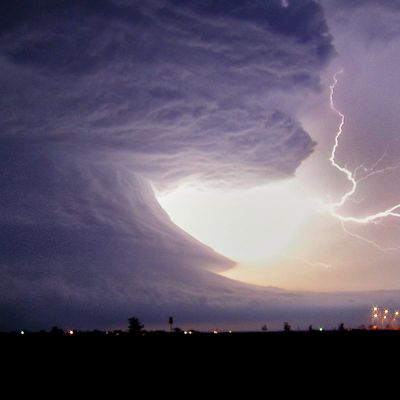
In the second of his Duino Elegies, the German language’s most lyrically intense poet, one Rainer Maria Rilke, declares “Ein jeder Engel ist schrecklich,” a line best translated as “Every angel is terrifying.” The divinity that Rilke invokes is “almost deadly,” he says in the next line, and to encounter it provokes not only reverence, but terror.
This fear and trembling version of awe, so long described in the humanities, is now being lassoed by social science. In a new paper (awesomely titled “The dark side of the sublime”), Amie Gordon at the University of California, San Francisco, and her colleagues dig into “threatening awe.” Awe is getting research attention, the authors observe, but it’s usually characterized as the kind prompted by nature’s beauty (sunsets!), leaderly virtue (Mandela!), and divine benevolence (New Testament!). Yet, they argue, people can also feel awe in regard nature’s destructiveness (thunderstorms!), leaderly coercion (Hitler!), and divine wrath (Old Testament!). The authors note that this isn’t just found in Western culture: “For example,” the write, “the Chinese term for awe, 敬畏, is a combination of respect and fear.”
Establishing a beachhead of a new psychological construct takes some doing. It begins, in this case, with an experiment where a combination of about 200 undergrads and online participants were asked to write about an experience of intense awe. Consistent with the researchers’ inquiry, 21 percent of respondents include some sort of “threat appraisal” in their narratives, like being “completely awestruck by September 11th” or being in “awe at life and its many joys and sorrows” after the Challenger explosion,” or the personal danger felt in peering down over a mountain ledge to a lake 2,000 feet below. (Nature or a fellow human were the most frequent sources of threatening awe, unlike positive awe, which is also likely to spring from music, art, and architecture.)
A follow-up experiment found that threatening awe was associated with uncertainty and a loss of personal control. Finally, another experiment, as Alex Fradera notes at the BPS Research Digest, found that threatening awe “may be influenced by thoughts which make us actively feel powerless — the prospect of being trapped on the pitiless ocean — rather than simply small, such as reflecting on the vastness of the cosmos.” Given all that, you might not be surprised to hear that threatening awe didn’t have the same boosts for well-being that awe is becoming known for. This is an important, and also uncomfortable, point: What is profound is not necessarily positive, and future studies into awe should account for that. Like Rilke observed, despite the halo, angels still terrify.




